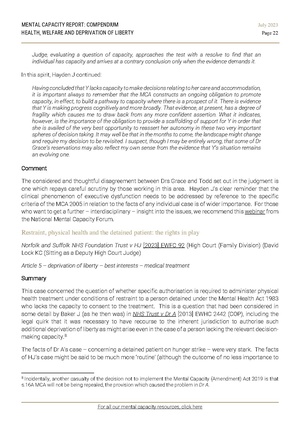Norfolk and Suffolk NHS Foundation Trust v HJ [2023] EWFC 92
Essex
This case has been summarised on page 22 of 39 Essex Chambers, 'Mental Capacity Report' (issue 133, July 2023).
ICLR
The ICLR have kindly agreed for their WLR (D) case report to be reproduced below. For full details, see their index card for this case.
The WLR Daily case summaries
Family Division
Norfolk and Suffolk NHS Foundation Trust v HJ
2022 May 24; 2023 June 17
David Lock KC sitting as a High Court judge
Mental capacity— Incapable person— Deprivation of liberty— Person lacking mental capacity detained in hospital for psychological treatment also requiring separate treatment for physical conditions— Treating trust concerned that restraint required to administer treatment for physical conditions amounting to further deprivation of vulnerable adult’s residual liberty— Whether such restraint further deprivation of liberty requiring authorisation under inherent jurisdiction of High Court— Human Rights Act 1998 (c 42), Sch 1, Pt I, arts 5, 8 — Mental Capacity Act 2005 (c 9), ss 4, 6
A vulnerable adult was admitted to hospital and detained for treatment pursuant to section 3 of the Mental Health Act 1983. Alongside her mental health conditions she suffered significant physical ailments requiring discrete treatment (thus falling outside section 63 of the 1983 Act) which she frequently refused as a result of her lack of understanding. The treating trust was concerned that the restraint of the incapacious adult to administer treatment for her physical conditions, although necessary and well managed, constituted a further deprivation of her residual liberty that fell outside the scope of the statutory scheme, particularly section 6 of the Mental Capacity Act 2005, which authorised restraint for treatment relating to her mental health. Accordingly the trust applied to the High Court for a declaration under the inherent jurisdiction that a further deprivation of the vulnerable adult’s liberty was lawful.
On the trust’s application—
Held, declaration under the inherent jurisdiction not made. (1) The following principles, distilled from the established authorities, were applicable to an assessment as to whether medical treatment provided to someone in lawful detention amounted to a further deprivation of their liberty: (a) the starting point was that it would only be in exceptional cases where something that happened to a person who had already been lawfully deprived of their liberty would amount to a further deprivation of that person’s residual liberty; (b) article 5 of the Convention for the Protection of Human Rights and Fundamental Freedoms arose for consideration only in an exceptional case because the usual position was that article 5(1)(e) was not in principle concerned with suitable treatment or conditions; and (c) the acid test for the engagement of article 5 in any case involving an alleged deprivation of residual liberty was whether there was an unacceptable element of arbitrariness in the actions taken by a state body which were said to deprive a person of their residual liberty. Therefore, save in exceptional circumstances, any proper and lawful exercise of clinical judgment by clinicians in administering medical treatment to a detained person did not amount to a deprivation of that person’s residual liberty where there was no element of arbitrariness in the actions of the clinical staff. Where restraint was imposed to enable the administration of treatment for a physical health condition to a person who lacked capacity to consent under the Mental Capacity Act 2005, the lawfulness of that restraint was set out in section 6 of the 2005 Act and, where those condition were satisfied, there was no independent breach of a person’s rights under article 5 of the Convention. Here, where the trust was discharging its duty to provide the vulnerable adult with appropriate medical treatment to meet her physical and psychological needs in a non-arbitrary manner, the acts taken by the clinical staff did not amount to the type of exceptional circumstances which could lead to a further deprivation of the vulnerable adult’s residual liberty. Accordingly, where the 2005 Act provided a sufficient framework for governing the lawfulness of the trusts actions, there was no need for a declaration under the inherent jurisdiction (paras 32, 33, 38).
Ashingdane v United Kingdom (1985) 7 EHRR 528, Munjaz v United Kingdom [2012] MHLR 351 and R (Idira) v Secretary of State for the Home Department [2016] 1 WLR 1694B, CA applied.
(2) Although the vulnerable adult’s rights under article 8 of the Convention were engaged by decisions made by the trust, both to restrain and administer treatment to her, the decision-making process mandated by sections 4 and 6 of the 2005 Act satisfied the requirements of fairness and properly respected her article 8 rights. Where the further procedural requirements introduced by the Mental Health Units (Use of Force) Act 2018 were, on the evidence, also being diligently followed there was no need to supplement the existing legal obligations imposed on the trust with a separate court order ensuring compliance with the vulnerable adult’s article 8 rights, as had been imposed in older authorities (paras 34–37).
J Council v GU [2012] EWCOP 3531B considered.
Nicola Greaney KC (instructed by Kennedys Law LLP) for the NHS trust.
Rhys Hadden (instructed by the Official Solicitor) for the Respondent.
Thomas Barnes, Solicitor
Referenced Legislation
Human Rights Act 1998 (c 42), Sch 1, Pt I, arts 5, 8
Mental Capacity Act 2005 (c 9), ss 4, 6
Full judgment: BAILII
Subject(s):
- Medical treatment cases🔍
Date: 17/6/23🔍
Court: Family Court🔍
Judge(s):
- David Lock🔍
Parties:
Citation number(s):
What links here:- Updates
- Mental Health Units (Use of Force) Act 2018
- 39 Essex Chambers, 'Mental Capacity Report' (issue 133, July 2023)
Published: 3/7/23 23:37
Cached: 2025-04-08 07:52:48
